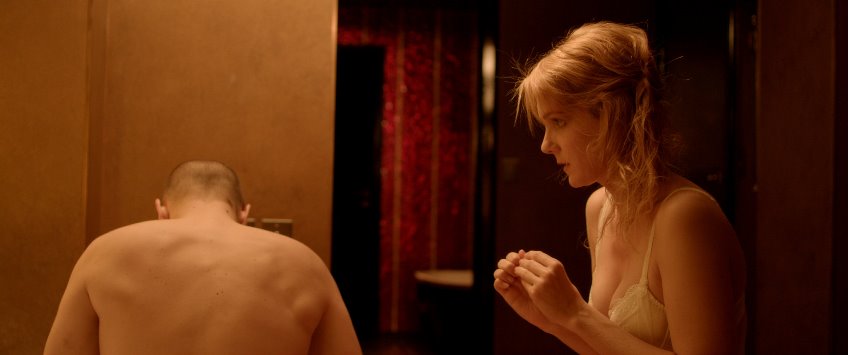Alice (from July 24, 2020) Cert.15, 105 mins. Alice will be released on selected digital platforms (Curzon Home Cinema, The BFI Player, Barbican Cinema On Demand, Amazon Prime Video)
Alice, a beautiful, blond bourgeois woman with an adoring husband, adorable toddler and roomy, chic apartment, is not so much a Belle de Jour as a Belle de Nuit, but writer-director Josephine Mackerras’ French drama cannot escape comparison with Buñuel’s masterpiece. A closer comparison, however, must be with the character played by Elizabeth Debicki in British director Steve McQueen’s 2018 film, Widows.
Her name is Alice, too, and though the nationalities are different, their stories are similar. What distinguishes Mackerras’ entertaining if unexceptional film is the watchable actress Emilie Piponnier and a revenge plot that emphasises, albeit none too subtly, the double standards between the sexes inherent in Widows. Unfortunately, this main plot is left unresolved when a new, and not altogether convincing relationship hijacks the film.
The first ten minutes of the film establish what seems like Alice Ferrand’s (Piponnier) perfect life. Alice and her partner, François (Martin Swabey) play with their adorable toddler Jules (Jules Milo Levy Mackerras), kiss lovingly and entertain friends with delicious cooking in a kind of dinner party that is a staple of French cinema. The dinner party is not just an occasion to show the discrete charm of the bourgeoisie, however, but is also used to stage arguments, capture gestures and looks and even hint at problems in a relationship.
The best part of the film is Alice’s realisation that the doting partner and father of her precious child is someone else. For that reason, it is best that viewer is left to savour Alice’s transformation as she comes to terms with a shocking reality.
Instead, we can think back to Widows. When Alice’s abusive husband in the film is killed during a get-rich-quick burglary, she gains her freedom, but loses her luxurious lifestyle. Encouraged by her mother, Alice reluctantly becomes a sugar baby. One of her clients is, conveniently, in real estate and can help her with her revenge plot.
Alice Ferrand is equally reluctant to sell her great body, but what begins as an investigation into François’s secret life, a life so expensive that their mortgage is about to be foreclosed, becomes a way to keep a roof over Jules’ head. The money is great and the flexible hours leave her days free for Jules. And conveniently enough, one of Alice’s clients happens to be a divorce lawyer.
Fortunately, the contrivance of the kind-hearted, useful client is not quite as material to the plot here as it is in Widows. There is another friendship that becomes more central to the plot, that of Lisa (Chloé Boreham). Lisa, an experienced, sympathetic sex worker takes Alice under her wing and even helps her rebound when she is dismissed by her agency for missing an appointment.

This new dilemma is the outcome of a tense and well-dramatised scene in which Alice is left without a child minder. Desperate to keep the rendezvous, she shows up unannounced at a nearby friend’s house with Jules in her arms, heavily made up with a skimpy dress, begging for a favour. When the neighbour refuses, Alice runs home and contemplates leaving Jules sleeping in his crib. Distraught, she heads out the door before recovering her senses.
While Alice is bringing in enough money to buy back her apartment, this well-paid job is only a stopgap, short-term solution to her dilemma and creates its own problems. It would be a spoiler to tell you what happens with François, but the double standards fly at us, in the bank manager’s treatment of Alice, in François’s hypocrisy, and in society’s attitude to working mothers. When a custody battle risks putting the only thing she cares about at risk, Alice turns to Lisa once more for a long-term solution.
There are several reasons to see this film, but the main one is Piponnier. You never get tired of watching her as she takes us with her on a convincing emotional roller coaster of a journey from a deluded wife and mother to a newfound confidence and sense of self. Mackerras knows how to make us squirm with the uncomfortable early sex scenes. Piponnier’s body language is spot-on, and as we follow her from gauche, awkward learner, to someone who is unassumingly controlling the situation, the sex scenes become less uncomfortable for the viewer as well.
Another reason is to watch the friendship between Lisa and Alice develop against the backdrop of a Paris that is off the beaten track. There are problems with the film, too. There is not enough depth in the relationship between the two women to prepare us for the ending, or perhaps we are too distracted by the conflict with an increasingly frightening François to want to focus on it.
You wonder, too, where Alice’s parents, relatives, close friends, work colleagues and lawyers (even legal aid) are in all of this. Are all of those dinner party guests as superficial and judgmental as the neighbour who rejects the child-minding job?
There is no indication, however apposite this twist would have been that François used his duplicitous nature and domineering personality to separate Alice from the outside world, thereby increasing her vulnerability and dependence. Was François particularly adept at deceit or had Alice invested too much in her dream life to be willing to spot the signs? Mackerras seems more interested in creating situations than characters. The relationship with Lisa that is thoroughly credible for most of the story, introduces at the end an element of sexual ambiguity that is much less believable, and leads to an unsatisfying ending.




